The USSR broke up into 15 states. Party apparatchiks took power almost everywhere. The exception was Belarus. Here the president was a man of the people. He defeated the post-communist prime minister who controls the media and state institutions. Alyaksandr Lukashenka achieved a truly democratic triumph.
When Belarus gained independence, Alyaksandr Ryhoravich Lukashenka, director of the state farm, was a rank-and-file member of parliament. He belonged to the party, but acted as an independent politician. He posed as a supporter of democracy and an opponent of the collapsing system, but soon became a supporter of the reconstruction of the Soviet Union. 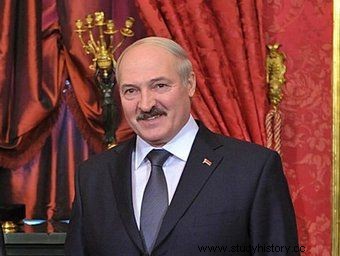
He collaborated once with nationalists, once with communists . He spoke on a daily basis and on everything:in the Verkhovna Rada, where he held office, on radio and television ... He told people what they wanted to hear in plain (and even coarse) language and catchy slogans. He quickly became recognizable.
Buster of corruption
The turning point of the future dictator's career was on June 4, 1993, when he was elected chairman of the parliamentary anti-corruption commission. The national opposition saw him as a tool of the party's struggle against the nomenclature.
The post-communist majority believed that it would be able to run it easily. But he outmaneuvered both . He used the position to collect hooks and create himself as a conqueror of thieving politicians.
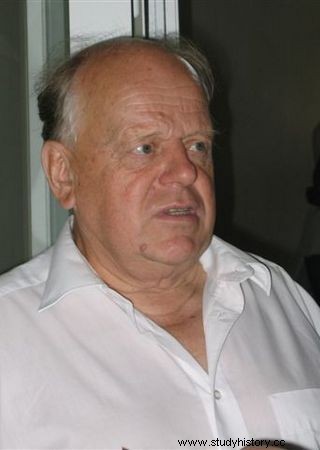
One of the victims of Lukashenka's accusations was Stanisłau Szuszkiewicz, the then speaker of parliament and head of state (photo:Mariusz Kubik; license of GNU FDL 1.2).
Andrzej Brzeziecki and Małgorzata Nocuń, authors of the book “Lukashenka. The would-be tsar of Russia ", they talked to a member of the commission, Siarhej Antonczyk, who described his boss's attitude as follows:
He went crazy after his status rose. He was already a different man. He spoke for hours at meetings. He did not let others speak. He was not interested in corruption as a problem to be solved, but in collecting receipts for people . We had information about the fraudulent interests of the Kiebicz family. When we raised the matter in committee, Lukashenka told us to leave it.
The president is stealing dollars
The society was becoming poorer, but so were the fortunes of people who acquired state property for a song. So there was a need for a politician who would fight the dishonesty of the authorities. In December, Lukashenka presented a report on the work of the commission in which he made accusations left and right.
The allegations were sometimes bizarre. The speaker of parliament, who was then the head of state, Stanisłau Szuszkiewicz, was to appropriate the entire hundred dollars. In turn, the fault of one of the deputies was to be ... possession of a foreign car .
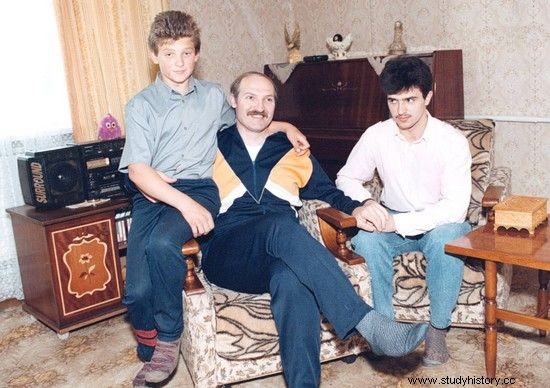
During the presidential campaign in 1994, Lukashenka posed not only as a providential man of Belarus, but also as a good father. In the photo with his sons:Wiktor and Dmitry (photo:materials from the book "Lukashenka. The would-be Tsar of Russia", SIW Znak 2014).
The real effects of this performance were dubious to say the least, but they were enough to ensure its author recognition and popularity. To keep the atmosphere alive, Alyaksandr Ryhorawicz announced that he would soon reveal more compromising facts.
Soon Szuszkiewicz was dismissed and preparations for the presidential election began. The main favorite was the post-communist apparatchik, Prime Minister Vyacheslau Kiebich.
The dismissed chairman of the Supreme Council and the leader of the national opposition, Zianon Paźniak, also stood as a candidate. And Lukashenka, who gathered the most competent staff around him. It was made up of young and ambitious politicians who expected that the go-getting director of the state farm would give them a pass to power.
Mission impossible?
Theoretically, Lukashenka and his team faced an almost impossible task. With the exception of the Baltic states, representatives of the local party elites took power everywhere in the former Soviet republics. In Belarus, Kiebich could count on the support of the state apparatus and his group's base. He limited competitors' access to the media. He was supported by Moscow. How to compete with such an opponent?
Lukashenka spent the campaign in constant rallies and meetings with voters, to which he delivered passionate speeches. He acted as a spokesman for the common people. He used the vocabulary, manners and reasoning of those who were to vote for him. Instead of a company Mercedes, he drove around the city by bus or tram.
He promised to put corrupt politicians behind bars, reintegrate into Russia and universal welfare. And people believed him . After its perorals, the audience did not hide their emotions, they were overwhelmed with enthusiasm. They soaked up populist cliches like sponges. Alyaksandr Ryhorawicz's support grew by as much as 2% a day.
Fake swing
As if that were not enough, Lukashenka probably faked an attack on himself. The media reported that his car had been shot at during his return from an election meeting. Nobody was hurt, but the message was clear:the political mafia does not want their greatest enemy to win, they are trying to kill or intimidate him.
A police investigation found that a shot at the presidential candidate was fired from just a meter away, from inside the vehicle, but who cares about such trifles? Not voting anyway.
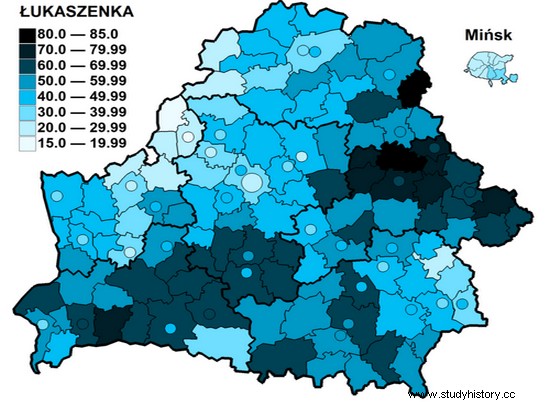
Alexander Lukashenka's results in the first round of the presidential elections for Belarus in 1994 (author:Bladyniec; license CC BY-SA 3.0).
The first round of elections was a huge success for Lukashenka:the support of 44.82% of voters with a turnout of nearly 4/5 of eligible voters. In Minsk, he received the support of only 26.5% of the population, but he won thanks to the province. Kiebicz, who was blamed for the economic crisis, was second with only 17.33%. They were both supposed to meet in the next round.
Democratically elected… dictator
Lukashenka decided to repeat the number from before the first round of elections in a new form. Although the seat of his anti-corruption commission had been closed and sealed for months, the presidential candidate decided to enter it. The policemen guarding the door got into a scuffle with him, his jacket was torn. An anti-corruption fighter, and de facto comedian and buffoon, he was again a victim of power.
On July 10, 1994, exactly 20 years ago, the second round of elections took place. Lukashenka achieved a devastating victory in them:as many as 80.34% of those taking part in the vote put a cross next to his name . A man whom nobody took seriously a moment ago, defeated his post-communist rival against all odds, a victory not so long ago.
The triumph and funeral of democracy
He perfectly used a unique set of circumstances:the appointment of the head of the anti-corruption commission, the anti-establishment attitude of voters, the rivalry of democratic candidates such as Paźniak and Szuszkiewicz, who took each other's votes. Kiebicz's great trump card, i.e. his ties with Moscow, was partially neutralized by his equally pro-Russian rhetoric.
As Andrzej Brzeziecki and Małgorzata Nocuń write in their book, there is no evidence that the Russian secret services were behind the success of the sovkhoz director, and they add: no one forced Belarusians to vote for Lukashenka . He himself convinced them to do so .
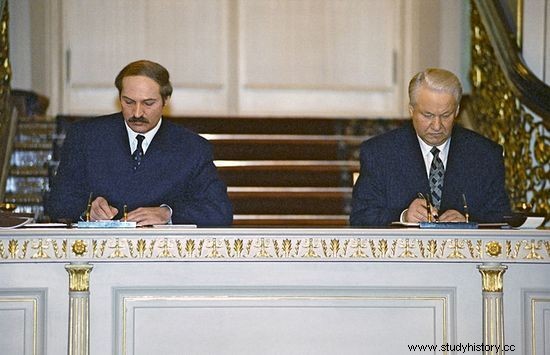
In the 1994 election campaign, Lukashenka promised reintegration with Russia, and he fully kept his word here. In 1997, the act of establishing the Union of Belarus and Russia was signed (source:RIA Novosti; lic. CC BY-SA 3.0).
He came to power as a kind of people's tribune, raised thanks to the genuine support of the masses in a free vote. However, he was not a true spokesman for society or an ideological supporter of civil rights. He was interested in a personal career and the highest power possible.
The triumph of democracy also turned out to be the beginning of her funeral, and the democratically elected president soon became Europe's last dictator .
